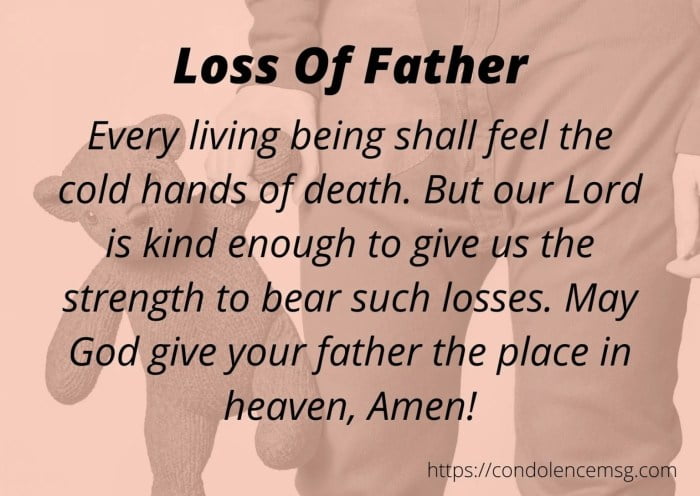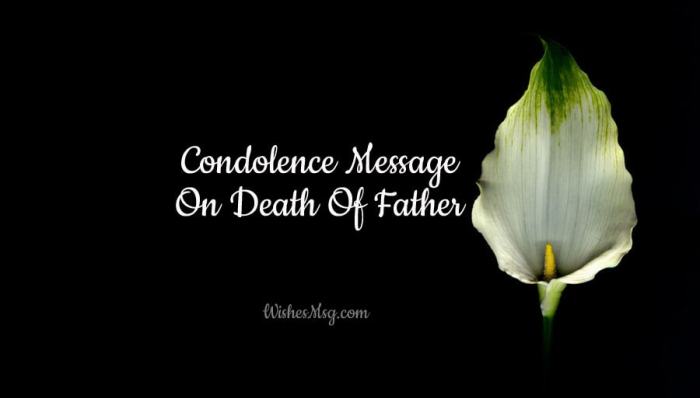When a father passes away, it is a profound loss that reverberates through the hearts of family and friends. However, when the relationship with the deceased father was strained or estranged, the grieving process can be particularly complex and emotionally challenging.
In this guide, we will delve into the nuances of estrangement in family relationships, exploring its various forms and the reasons why it may occur between a father and child. We will also provide guidance on how to craft a sincere and respectful condolence message in such circumstances, addressing specific situations and offering sample messages and phrases that convey empathy, understanding, and support.
Introduction
Expressing condolences upon the death of an estranged father is a complex and emotional experience. The estrangement may have been caused by a variety of factors, and the emotions surrounding the death can be complicated by feelings of grief, anger, guilt, and regret.
Acknowledging the Complexity
It is important to acknowledge the complexity of emotions that may arise when an estranged father dies. It is normal to feel a range of emotions, including sadness, anger, guilt, and relief. It is also important to remember that grief is a personal experience, and there is no right or wrong way to feel.
Finding Ways to Cope
There are a number of ways to cope with the death of an estranged father. Some people find it helpful to talk to a therapist or counselor, while others find comfort in talking to friends or family members. It is also important to take care of yourself physically and emotionally during this time.
This may include eating healthy, getting enough sleep, and exercising.
Understanding Estrangement

Estrangement is a state of emotional and social separation between family members. It can range from mild detachment to complete alienation. Estrangement can occur between a father and child for various reasons, including unresolved conflicts, abuse, neglect, differing values, or simply a lack of connection.
Reasons for Estrangement between Father and Child
There are many reasons why a father and child may become estranged. Some of the most common reasons include:
- Unresolved Conflicts: Long-standing conflicts or disagreements that have not been resolved can lead to estrangement. These conflicts may be related to finances, parenting styles, or personal values.
- Abuse or Neglect: Physical, emotional, or sexual abuse or neglect can cause a child to become estranged from their father. The trauma of abuse can make it difficult for a child to maintain a relationship with their abuser.
- Differing Values: As children grow older, they may develop values and beliefs that differ from those of their parents. This can lead to conflict and estrangement, especially if the parents are unable to accept their child’s choices.
- Lack of Connection: Sometimes, estrangement occurs simply because a father and child have never had a close relationship. This can be due to factors such as the father’s absence during the child’s upbringing or a lack of shared interests.
Impact of Estrangement on the Grieving Process
Estrangement can make the grieving process more difficult for both the estranged child and the father. The child may feel guilty or ashamed about the estrangement, and they may struggle to come to terms with the death of their father.
The father may also feel grief and regret over the estrangement, and they may wish they had had a chance to reconcile with their child before they died.
Crafting a Sincere Message
Writing a condolence message to an estranged father can be a challenging task. Here are some tips on how to approach it with sincerity and empathy.
It’s important to acknowledge the loss and express your sympathy, even if you had a strained relationship. Consider writing a letter or sending a card that acknowledges the passing of your father and expresses your condolences to your family.
Expressing Empathy
Empathize with the loss that your family members are experiencing, regardless of your personal feelings towards your father. Express your understanding of the pain they may be going through.
Addressing Unresolved Feelings
If you have unresolved feelings or regrets about your relationship with your father, consider addressing them in a respectful manner. Avoid placing blame or making accusations, as this may cause further pain to your family.
Focus on the Positive
If possible, try to focus on the positive aspects of your relationship with your father, or on the memories you have of him. This can help to create a sense of closure and healing for both you and your family.
Addressing Specific Situations
Navigating estrangement in the context of a father’s death can be complex and emotionally challenging. Here are some guidelines for handling specific situations:
Recent or Ongoing Estrangement
In cases where the estrangement was recent or ongoing, the emotional wounds may be fresh and raw. Consider these suggestions:
- Acknowledge Your Emotions: Allow yourself to grieve and process the emotions that arise, whether they are anger, sadness, or a mix of both.
- Reach Out to Trusted Individuals: Seek support from friends, family members, or a therapist who can offer a listening ear and provide emotional guidance.
- Reflect on the Estrangement: Take time to reflect on the factors that led to the estrangement. This can help you gain a deeper understanding of the situation and potentially find closure.
Strained Relationships with Other Family Members
Estrangement from a father can often lead to strained relationships with other family members. Here’s how to navigate these situations:
- Open Communication: If possible, try to communicate openly and honestly with other family members about your feelings and experiences. This can help foster understanding and potentially rebuild connections.
- Set Boundaries: Establish clear boundaries with family members who may be insensitive or hurtful. This can involve limiting contact or setting specific expectations for interactions.
- Seek Support: Reach out to friends, support groups, or a therapist who can provide guidance and emotional support as you navigate these complex relationships.
Abusive or Neglectful Father
In cases where the deceased father was abusive or neglectful, the emotions surrounding their death can be particularly complicated. Consider these suggestions:
- Process Your Emotions: Allow yourself to feel and process the emotions that arise, including anger, grief, and a sense of betrayal. It’s important to acknowledge and validate these emotions.
- Seek Professional Help: Consider seeking support from a therapist or counselor who specializes in trauma and abuse. They can help you process your emotions and develop coping mechanisms.
- Focus on Self-Care: Prioritize self-care and self-compassion during this difficult time. Engage in activities that promote your well-being and help you cope with the emotional challenges.
Sample Messages and Phrases
Crafting a condolence message for the loss of an estranged father can be a complex and emotional task. Below are some sample messages and phrases that may help you convey your sympathy and support.
The table below provides examples of condolence messages tailored to different scenarios. Each message offers a unique approach to expressing empathy, understanding, and support.
Sample Messages
| Scenario | Message |
|---|---|
| When you have positive memories of your father | “Although our relationship was strained, I remember the good times we shared, and I will cherish those memories forever. I extend my deepest condolences during this difficult time.” |
| When you have unresolved emotions or regrets | “I know we had our differences, but I always hoped we would eventually reconcile. I regret that we didn’t have the chance to mend our relationship. I offer my sincere condolences and support during this time of grief.” |
| When you feel guilty or responsible for the estrangement | “I know I contributed to the estrangement between us, and I deeply regret that. I extend my heartfelt condolences and hope you can find some peace and comfort in the memories of the good times you shared with your father.” |
| When you want to offer practical support | “I understand this is a challenging time for you and your family. I want to offer my support in any way I can. Please let me know if there’s anything I can do to help.” |
Phrases to Express Sympathy, Understanding, and Support
- “I am deeply sorry for your loss.”
- “My thoughts and prayers are with you and your family during this difficult time.”
- “I know words cannot express the pain you are feeling, but I want you to know that I am here for you.”
- “Your father was a remarkable person, and I will always remember him fondly.”
- “I understand that your relationship with your father was complicated, but I want you to know that I am here to listen if you need someone to talk to.”
- “I know this is a difficult time for you, and I want to offer my support in any way I can.”
Expressing Regret or Unresolved Emotions Constructively
- “I regret that we didn’t have the chance to reconcile before he passed away.”
- “I know I made mistakes that contributed to our estrangement, and I am deeply sorry for that.”
- “I hope that one day we can find a way to heal the wounds of the past and move forward.”
- “I know that your father loved you very much, even if he didn’t always show it.”
- “I hope you can find some comfort in the memories of the good times you shared with your father.”
Additional Considerations

When crafting and delivering a condolence message for the death of an estranged father, it’s crucial to consider various factors to ensure respect, empathy, and self-care during this difficult time.
Empathy and Understanding: Put yourself in the recipient’s shoes and try to understand their emotional state. Acknowledge the complexity of their feelings and refrain from making assumptions or judgments.
Respectful and Appropriate Delivery
- Consider the Medium: Choose a suitable method of communication that respects the recipient’s preferences. It could be a personal letter, a phone call, or a face-to-face conversation.
- Be Respectful of Boundaries: Respect the recipient’s boundaries and don’t push them to engage in a conversation if they’re not ready. Allow them to grieve and process their emotions at their own pace.
- Choose the Right Time and Place: Select a suitable time and place for the conversation, ensuring privacy and a supportive environment.
Self-Care and Seeking Support
- Prioritize Self-Care: Acknowledge your own emotions and take care of your well-being during this challenging time. Engage in self-care activities that promote your physical and mental health.
- Seek Support from Loved Ones: Reach out to trusted friends, family members, or a therapist for support and guidance. Talking about your feelings can help you process the grief and cope with the loss.
- Consider Professional Help: If you’re struggling to cope with the emotions or the estrangement, consider seeking professional counseling or therapy. A therapist can provide a safe space to process your feelings and develop coping mechanisms.
Last Recap

Navigating the loss of an estranged father requires sensitivity, empathy, and a willingness to acknowledge both the pain of the loss and the complexities of the relationship. By approaching this difficult situation with care and consideration, we can honor the memory of the deceased while also respecting the boundaries and emotions of those left behind.
Questions and Answers
What are some common reasons for estrangement between a father and child?
Estrangement can occur due to various reasons, such as unresolved conflicts, differing values or beliefs, abuse or neglect, abandonment, or simply a lack of emotional connection.
How can estrangement affect the grieving process?
Estrangement can complicate the grieving process, leading to feelings of guilt, regret, anger, and unresolved emotions. It can also make it challenging to find support and comfort from family members who may have been closer to the deceased.
What should I keep in mind when writing a condolence message for the loss of an estranged father?
When writing a condolence message, it is important to acknowledge the loss and express empathy for the recipient’s grief. It is also important to be respectful of the estrangement and avoid bringing up unresolved issues or making assumptions about the relationship.
What are some sample phrases or sentences that I can use in a condolence message for the loss of an estranged father?
Some sample phrases or sentences that you can use include: “I am sorry for your loss. I know that your relationship with your father was complicated, but I hope you can find comfort in the memories of the good times you shared.”
or “Your father may be gone, but his memory will live on in the hearts of those who loved him.”
